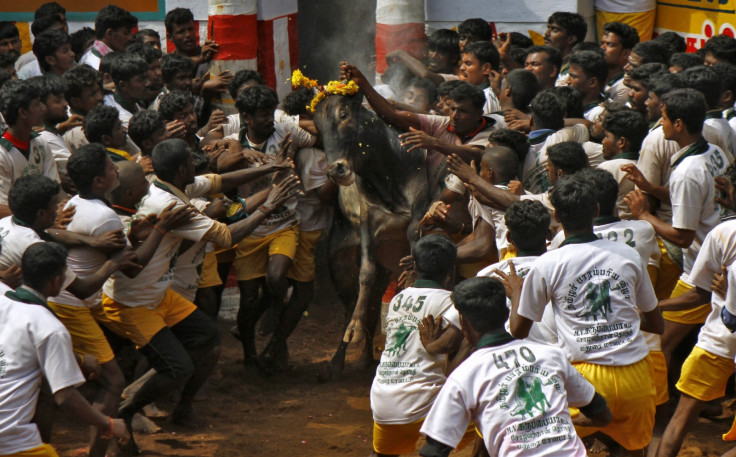Jallikattu: Tamil Nadu on the horns of a dilemma after ban on bull sport sparks massive protests
Thousands, including software engineers, protesting in the southern Indian state to have ban on bull sport lifted.

Aruna Dhanapal, 29, sits restlessly in her Brighton house frantically switching between Tamil news channels and cyberspace to closely monitor what is happening back home in south India. In the middle of managing her two-year-old playful son, Dhanapal, along with her husband, keeps track of the rapidly developing situation in Tamil Nadu over Jallikattu, the bull-embracing festival.
Dhanapal, who and her family originally hail from the fertile delta region of Tanjore, promises she would have been among the tens of thousands of pro-Jallikattu protesters gathered at the famed Marina beach in Chennai, the capital city of Tamil Nadu and the epicentre of the protests, if she was in India at the moment.
Fuelled by Facebook and other social media, the demonstrations in Chennai and several parts of Tamil Nadu have gathered pace quickly over the past few days with thousands of supporters erecting makeshift structures calling for the withdrawal of the ban on the sport celebrated as a festival.
"Bulls and cows have a special space in our Tamil culture. This ranges from cattle being worshipped as Gods to folk tales of kings sacrificing their lives for the sake of animals to farmers taking care of them today," said Dhanapal in a video chat with IBTimes UK.
She has vivid memories of spending her childhood days with the cattle she grew up with. "Tamil bulls are uniquely agile and majestic, and dedicated festivals like Jallikattu are key to preserve the native breeds in this region."
Being a passionate defender of the festival, Dhanapal says the pro-Jallikattu activists need to be thanked for uniting the people of Tamil Nadu. They are the reason the latest protests have begun to spread like wild-fire, she says.
Apart from the federal government headed by Prime Minister Narendra Modi, the the US-headquartered animal rights group People for the Ethical Treatment of Animals (Peta) has become an object of fury. Peta and other animal welfare organisations which are in the forefront of the pro-ban activists have alleged that the bulls are subjected to cruelty for human entertainment.
Despite multiple attempts, the organisation's representatives could not be reached for comment.
Traditionally, the festival, known as "Erudu Thazhuvudhal" or "bull-embracing", occurs in mid-January to mark the harvest festival of Pongal in Tamil Nadu. During the occasion, young men compete with native-breed bulls, which are often specially grown as pets for the sport, by holding on to the animals' hump for a brief while. The bulls which take part in the festival are usually entirely taken care by the women folk of the households.
The protests are being spearheaded by students. They have been joined by even employees of the back-end software firms set up in the coastal city. Thousands of them spent the second night at the iconic beach demanding that the ban on the bull-embracing festival (sometimes mistakenly translated as a bull-taming sport) needs to be revoked. The protests originally began with just dozens, but have snowballed into a massive agitation with widespread support from political parties, film stars, culture activists and dignitaries. The latest to extend his support is five-time World Chess Champion Viswanathan Anand.
Tamil Nadu's recently installed Chief Minister O Pannerselvam has airdashed to New Delhi to seek Modi's help. Modi has reportedly said that since the matter is before the Supreme Court, it is sub-judice and nothing can be done.
"We will take a good decision soon," said the chief minister after meeting Modi, who, he said, respects "Tamil sentiments". According to observers, the chief minister risks the Supreme Court's wrath if the sport is allowed. If it is not, the protests are set to continue, bringing normal life to a standstill in the state.
According to reports, the protesters are in no mood to relent. "We don't want to lose our culture, pride and tradition at any cost. We're fighting for our rights here," said Vaishnavi Srinivasan, a software engineer who was protesting outside her firm for the sake of the traditional sport. "We will not lose our years and years of culture at the hands of those filthy groups opposing it. At the end of the day, I'm a Thamizhachi (Tamil woman) and I fight for my right."
The Supreme Court originally outlawed the event in 2014 on a petition by animal activists. Despite pleas, the court has refused to allow the sport in the last two years.
© Copyright IBTimes 2025. All rights reserved.




















